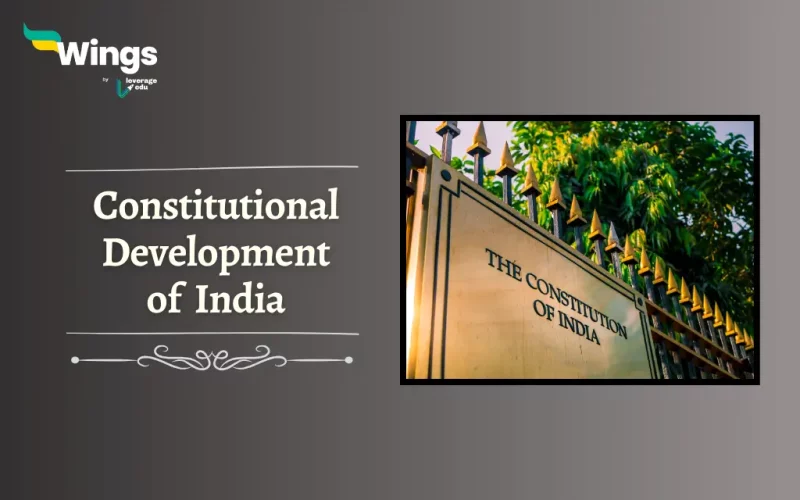The foundations of the Indian Constitution were laid right from the start of the British era. These were not accepted by Indians initially but most of them became inspiration for the constitutional development of India in the later years.
Moreover, many laws for the Indian constitutions were developed since 1857. However, there were some remarkable developments in the Constitutional Development of India between 1946 to 1950 that we are going to discuss.

Also Read: First India-Pakistan War of 1947-1948: Causes and Aftermath
Cabinet Mission in 1946
Table of Contents [show]
The Cabinet Mission of 1946 was brought up to discuss the governance of India and its unification. The most prominent feature was that the British Provinces and the Indian States would combine and form the Union of India. It also proposed setting up a Constituent Assembly with 389 members.
Furthermore, the majority of this Assembly was constituted by the interim government and 14 members from leading political parties. This was to facilitate legislation till a Constitution was made. In November 1946, the Constituent Assembly of India was formed as per the Cabinet Mission Plan.

Also Read: What was the Mountbatten Plan?
The Indian Independence Act of 1947
The Indian Independence Act of 1947 is one of the most controversial and debated Acts in the Constitutional Development of India. This act declared the partition of India into two independent dominions, namely India and Pakistan. Moreover, the two newly formed nations were required to follow the British rules and regulations until they developed each of their Constitutions.
The Government of India of Act 1935 was followed by the countries and was under the rule of their Constituent Assemblies for the time being. Nevertheless, the British control over the princely states was terminated with this Act. In addition, the Indian Independence Act was enacted on the 15th of August 1947, lapsing all British treaties over the princely states.
Also Read: Indian Nationalist Movement: Moderate Leaders of India
Constitution of Independent India
In February 1948 the former President of India presented a draft of the Indian Constitution. However, it was on the 26th of November 1949 that it was adopted by the Constituent Assembly. Consequently, the development of the Constitution of India took years. It finally came into force on the 26th of January 1950.
Also Read: Making of the Indian Constitution
Timeline of the Constitutional Development of India from 1946 to 1950
The timeline is as follows:
| Timeline of the Constitutional Development of India from 1946 to 1950 | |
| Date | Development in the Indian Constitution |
| 1946 | Following Britain’s decision to grant independence to India, a Cabinet Mission is sent to discuss the transfer of power. |
| 14th August, 1947 | A proposal is presented for the creation of Committees to draft the Indian Constitution. |
| 29th August, 1947 | The Drafting Committee is formed, with Dr. Bhimrao Ramji Ambedkar appointed as its Chairman. |
| 6th December, 1947 | The Constituent Assembly holds its inaugural session after elections, hence beginning the task of drafting the Indian Constitution. |
| 4th November, 1947 | The Drafting Committee completes and presents the draft of the Constitution for consideration. |
| 1948 to 1949 | Public sessions of the Constituent Assembly are held to discuss and refine the draft of the constitution. |
| 26th November, 1949 | The Constituent Assembly formally adopts the final draft, officially establishing the Constitution of India. |
| 26th January, 1950 | India’s new Constitution comes into effect, marking the country’s transition to a Republic. |
Relevant Blogs
This was all about the Constitutional Development of India. If you want to read more articles like this! You can get Study notes on the Modern History of India here. Also, you can visit our general knowledge page on Indian History!
 One app for all your study abroad needs
One app for all your study abroad needs















 45,000+ students trusted us with their dreams. Take the first step today!
45,000+ students trusted us with their dreams. Take the first step today!
